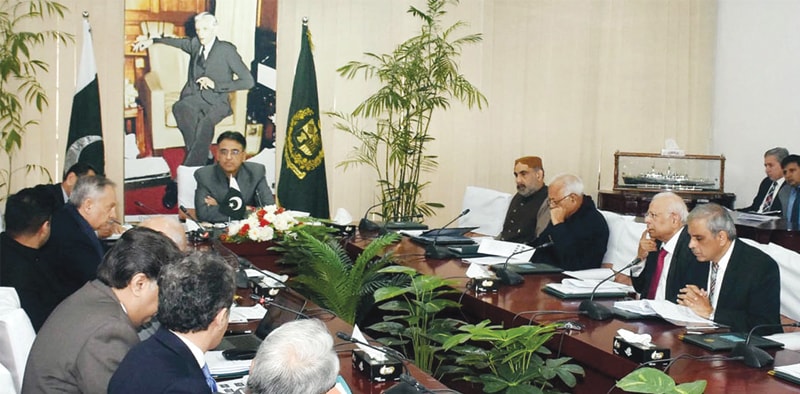ISLAMABAD: Amid poor availability of basic facilities hampering special economic zones (SEZs), the Economic Coordination Committee (ECC) of the Cabinet on Monday ordered plans within 30 days to ensure provision of electricity and gas utilities and cutting down by half the processing time for investment proposals.
The ECC meeting presided over by Minister for Finance Asad Umar also approved Rs833 million to clear dues to the employees of Pakistan Machine Tool Factory (PMTF).
The meeting – cut short by an engagement of Prime Minister Imran Khan – deferred discussions on measures for better placement of human resource abroad at improved wages.
In a presentation, Chairman Board of Investment (BoI) Haroon Sharif informed the ECC that not more than 10pc electricity and gas was available at all the 10 SEZs currently considered in progress. These included three prioritised SEZs under the China-Pakistan Economic Corridor (CPEC) and seven new SEZs in pipeline.
The meeting was informed that total electricity requirement of these 10 SEZs stood at 972MW but only 96.7MW capacity had so far been made available. About 740MW electricity was required for three prioritised SEZs and 400MW for the remaining seven. Likewise, the total requirement of gas had been worked out at 248.5 million cubic feet per day (mmcfd) but only 25mmcfd gas was available.
Approves Rs833m for employees of Pakistan Machine Tool Factory
For example, the Faisalabad M3 SEZ was on the top priority, but only 60MW had been made available to it against a requirement of 360MW while Bin Qasim Park had been given only 4.5MW against its requirement of 160MW. Quaid-e-Azam Apparel Park required 240MW though electricity available at its gates was no more than 2.2MW.
Almost similar conditions prevailed at the other SEZs as well both in terms of gas and electricity availability, the meeting was informed.
There were also governance related issued with SEZs in the absence of a tangible regulatory and enforcement arrangement or a body and SEZs were also being misused by the investors and there was no law that bind relocation of local industry inside SEZs.
It was also reported that there were non-functional layers of institutions like SEZ committees and Special Economic Zone Authorities (SEZAs) and there was duplication of roles among the assistant commissioners and boards of approvals (BoAs). On top of that, security arrangements were insufficient in some cases and required to be supported by special police units by the provinces. Also, execution of lease agreements were also taking time, virtually disappointing the investors.
The meeting was told that concession agreement for the 1,000 acre Rashakai SEZ was expected to be signed during the current month and was currently awaiting clearance from Environmental Protection Agency. Likewise, the M3 Faisalabad zone (1,000 acres) was awaiting finalization of its master planning and detailed design by June 2019. On the other hand, the Dhabeji zone over 1,500 acres would be launched by the provincial government for which it was international competitive bidding was due this month.
It was reported that a large cost variation in the cost of land for various SEZs was also a disincentive for investors unlike other successful models in China, India and Vietnam where land was made available either by the government on lease, its cost was shared with investors, or discounts offered.
The meeting was briefed that the success of SEZs would depend on their forward and backward linkages with the domestic long term industrial policy and competitive advantages with neighbouring markets.
It was, therefore, decided by the ECC that BoI will reduce the time frame for approval of SEZ applications from 90 days to 45 days. Furthermore, it will propose certain changes in SEZ Act to make it more investor friendly. It was also decided that SEZs of Islamabad and Bostan will be included in the list of priority SEZs under CPEC.
The ECC also directed the BoI to revisit the requirements for setting up of tourism, IT and health related entities within the SEZs. On top of that, the Petroleum and Power Divisions were directed to devise a road map, within 30 days, for provision of electricity and gas to all industrial estates.
Salaries for PMFT workers
The ECC approved a request of the Ministry of Industries and Production for provision of Rs833m to PMTF for payment of employees’ salaries and retirement benefits.
The meeting was told that Rs737m was required on account of the retirement benefits till Dec 2018 which should be provided as a grant while remaining Rs96m for salaries be extended as a loan.
It was reported that PMTF had been accumulating losses since 2008 mainly due to non-diversification of products and a narrow customer base. Additionally, the PMTF was also on privatisation list and the banks did not extend the credit limit that affected its supply chain. Resultantly, it failed to settle dues of retired employees.
About 321 retired employees remained unpaid due to insufficient funds and some of them moved the Sindh High Court which held in its September 4, 2018 judgment the situation as “highly discriminatory” and ordered that the secretary should complete the exercise within 90 days.
The ECC was informed that the exigency to settle dues of 321 retirees, who remained unpaid whereas their colleagues of identical circumstances were paid, was imminent while another 94 retirees had been added to the list in December 2018. The Rs833m funds would be used for retirement benefits for left over employees who retired between December 2008 and December 2017 (Rs523m), retirement benefits for employees retiring in year 2018 (Rs214m) and salaries for the months of September to November 2018 (Rs96m).

